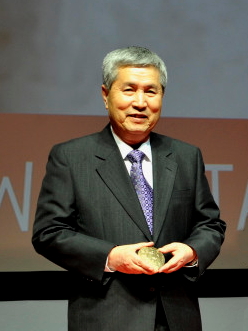- Im Kwon-taek
Infobox Korean name

imgwidth=200
caption=Im Kwon-taek at the 10thDeauville Asian Film Festival at the Centre international de Deauville, 2008.
hangul=임권택
hanja=林權澤
rr=Im Gwon-taek
mr=Im Kwǒnt'aekIm Kwon-taek (born
May 2 1936 ) is one ofSouth Korea 's most renowned film directors. In an active and prolific career, his films have won many domestic and international film festival awards as well as considerable box-office success, and helped bring international attention to the Korean film industry.Early life
Im Kwon-taek was born in
Jangseong ,Jeollanam-do and grew up inGwangju . After theKorean War , he moved toBusan in search of work. He then moved toSeoul in 1956, where director of "Five Fingers of Death " (1972),Jeong Chang-hwa offered him room and board for work as a production assistant. Jeong recommended him for directing in 1961.Career
Im's directorial premier was with the 1962 film, "Farewell to the Duman River" ("Dumanganga jal itgeola").
Before 1980 he was known primarily as a commercial filmmaker who could efficiently direct as many as eight genre pictures a year, helping to fulfill the quota for domestic pictures set by the government [http://www.bilaterals.org/article.php3?id_article=530] . His desire to make more artistically satisfying films began to show itself with his 1978 film "Jokbo" ("Genealogy" or "The Family Tree"), but the turning point of his career came with the 1981 film "Mandala". From this point his films have been regarded as art-house cinema, and have been regularly shown at international film festivals, and have won numerous awards.
Im has continued to explore themes from Korea's past while also focusing on the Korean cultural identity in modern times. Among Im's most notable recent films are "
Sopyonje " (1993) and "Chunhyang" (2000), both of which concentrate on the traditional Korean musical art ofpansori . The latter film was also based on a traditional Korean legend. Apart from being a critical success, "Sopyonje" was also a success at the box office, becoming the first domestic film to draw over a million viewers inSeoul alone. "Chihwaseon" (2002) was also a critical success, earning him Korea's first Best Director award at theCannes Film Festival . [cite web |last=Yang|first=Sung-jin|url=http://news.naver.com/main/read.nhn?mode=LPOD&mid=etc&oid=044&aid=0000069281|title=Great filmmaker Im to get French Legion of Honor|accessdate=2007-12-04|publisher= [http://www.naver.com/ www.naver.com] ] Im Kwon-taek was awarded an honorary Golden Bear award at theBerlin Film Festival in 2005.Im Kwon-taek's status, brought on by the critical success of his films, overlapped with a period of the film movement called "New Korean Cinema" or "Korean New Wave". Along with other directors, such as
Park Gwang-su andJang Seon-u , Im is recognized as one of the founding figures of the movement, which gained international critical recognition and acclaim for Korean Cinema.In April 2007, Im released his 100th film "
Beyond the Years ", an informal sequel to "Sopyonje". In November 2007 the French government announced that it would award Im the French Legion of Honor. [cite web |last=Lee|first=Hyo-won|url=http://www.koreatimes.co.kr/www/news/art/2007/12/141_14567.html|title=France to Award Director Im Kwon-taek|date=2007-11-28|accessdate=2007-12-04|publisher=The Korea Times ]Filmography
1960s
1990s
2000s
Awards
*Asia Pacific Film Festival
** Special Jury Award "Chunhyang" (2000)
** Best Director and Best Film "Sibaji" (1987)
*Berlin International Film Festival
** Honorary Golden Berlin Bear (2005)
*Cannes Film Festival
** Best Director "Chihwaseon" (2002)
*Grand Bell Awards (Korea), Best Director
** "Testimony" ("Jungon") (1974)
** "Jokbo" (Genealogy/Family Tree) (1979)
** "Mandala" (1981)
** "Ticket" (1986)
** "Yeonsan ilgi" ("Diary of King Yonsan") (1988)
*Hankuk Play and Film Arts Awards (Korea), Best Director
** "Wangshibri" ("A Byegone Romance") (1976)
** "Nakdongkaneun heureuneunga" ("Commando on the Nakdong River") (1976)
** "Angae maeul" ("Village in the Mist") (1983)
*Hawaii International Film Festival
** Best Feature Film "Chunhyang" (2000)
*Korean Film Critics Awards, Best Director
** "Gilsoddeum" ("Gilsodom") (1986)
** "Ticket" (1986)
*Pusan International Film Festival
** Netpac Award "Chunhyang" (2000)
*San Francisco International Film Festival
** Akira Kurosawa Award (1998)
*Shanghai International Film Festival
** Golden Goblet - Best Director "Seopyeonje" (1993)
*Singapore International Film Festival
** 2001 Silver Screen Award - Best Asian Director "Chunhyang" (2000)Notes
ee also
*
Cinema of Korea
*List of Korea-related topics External links and references
*
* [http://www.asianinfo.org/asianinfo/korea/perform/auteurs_and_korean_new_wave.htm Page about the Korean New Wave at asianinfo.org]
* [http://www.cinekorea.com/filmmakers/imkwontaek.html Biography and interview at cinekorea.com]
*
*
* [http://www.asianfilms.org/korea/im-reflection.html Interview: Reflection In A Mirror] at [http://www.asianfilms.org/ asianfilms.org]
*cite book|last=James|first=David E. (editor)|coauthors=Kim Kyung-hyun (editor)|year=2002|title=Im Kwon-Taek: The Making of a Korean National Cinema|publisher=Wayne State University Press|location=Detroit|isbn=0-8143-2869-5
*cite book|author= Lee, Young-il|year=1988|title=The History of Korean Cinema|publisher=Motion Picture Promotion Corporation|id=ISBN 89-88095-12-X, p.342-343.Persondata
NAME=Im, Kwon-taek
ALTERNATIVE NAMES=
SHORT DESCRIPTION=South Korea nfilm director
DATE OF BIRTH=May 2 1936
PLACE OF BIRTH=
DATE OF DEATH=
PLACE OF DEATH=
Wikimedia Foundation. 2010.
